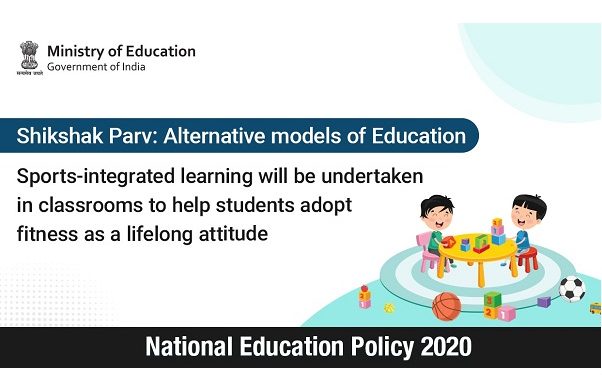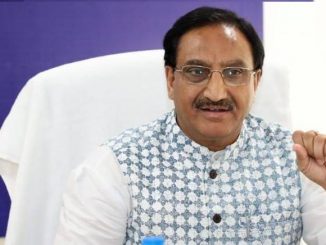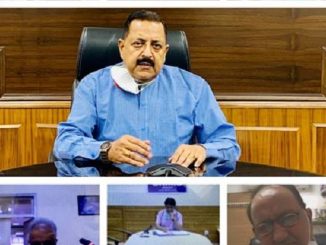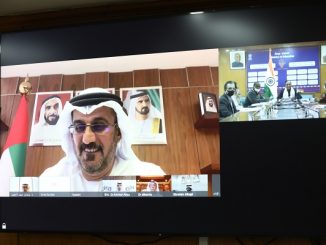
Sep 24: The National Webinar to discuss the implications of the National Education Policy for developing Alternative Models of Education in the country was held on 22 September 2020. The webinar was hosted by the National Institute of Open Schooling. Eminent educationists Prof. N K Ambasht, Former Chairman, NIOS and Prof. GirishwarMisra, Former VC, Mahatma Gandhi Hindi AntarrashtriyaVishwavidyalaya, Wardha were the panelists of the webinar. The webinar was moderated by NIOS, Chairman, Prof. Shridhar Srivastavaand Director (Academic), NIOS Dr Rajiv Kumar Singh.
Prof. Srivastava expressed concern on the issue of school drop outs as children and youth are being deprived of the fundamental right to education due to issues of access, poor quality and high cost of education. The formal system of schooling is not apt to provide suitable responses to these challenges, while through its inherent flexibility, open schooling caters to a range of learner needs. While the country has struggled to build schools and train teachers, both of which are necessary to achieve universal primary education, the limited primary infrastructures and inadequate economic resources and lack of quality teaching learning mechanisms to provide a quality secondary schooling are serious challenges that are being faced by policy makers. Therefore, there is a basic necessity of serious thinking and strategic planning to develop a mechanism for appropriate, economic and effective alternative systems of education to face the challenge of education at school level.
Prof. Srivastava outlined that the objectives of the webinar were to-
- discuss the provisions for alternative models of education in the NEP;
- explore alternative schooling models in India;
- suggest alternative pathways to formal education system;
- promote awareness and acceptance of alternative schooling models; and to
- mobilize existing resources in an effective manner.
Prof. Srivastava also mentioned that NIOS has taken the lead in empowering out-of-school children (OOSC) across the country, assisting millions of learners in completing their education in its three decades of its existence. He mentioned that some alumni of NIOS would also share their experiences of studying in NIOS.
Prof. Ambasht elaborated on the need for outcome based education today as he spoke of his experience of working with street children in Delhi earlier. He emphasized that children need ample opportunity to study at their own pace and could have better outcomes with experiential learning. Prof. Ambashtmentioned the need to understand the difference between curriculum and syllabus and that learning is long lasting when it is child centric and local centric. He also shared his concern for developing a system of evaluation that is diagnostic rather than declarative of pass or fail. Out of this was born the On-demand exam system of NIOS. He further discussed the role of teacher- as a Facilitator allowing construction of knowledge; He also discussed peer group study; online discussion forums. He emphasized the use of ICTs- Open educational resources and MOOCs. He also deliberated the requirement of reforms in assessment and evaluation- student autonomy in taking exams when ready; on-demand exams; online exams; assessment of values and aptitudes.
Prof. Misra emphasized that the process of evaluation should be a part of the teaching learning process rather than the end towards which the education process is aimed. Prof. Misra reiterated that the open schooling system should not be viewed as the only alternative to formal schooling- there are other systems such asgurukuls, pathshalas, madrassas, and homeschooling and open schooling should initiate a dialogue with them and interact with them to see how the process of certification can be linked with these systems. The open schooling system should not be just a supplement to formal schools which many has limitations. The mandate of open schooling should be broadened to nurture talent in different areas such as music, dance, sports; NIOS needs to initiate research to understand the changes taking place. Prof. Misra talked of multiple intelligence and the various ways in which people can be talented and achieve great heights- NIOS needs to become more efficacious to nurture this talent. He also mentioned the vocational education programme of NIOS and said that this is the need of the hour.
Dr Rajiv Kumar Singh emphasized the urgency to bring two crore out of school children back into the mainstream. Speaking of the provisions in the NEP 2020, he said that it calls for restructuring of school education emphasising on the need to provide equitable and quality school education for all children upto 18 years. It also allows for alternative models of education such as gurukuls, pathshalas, madrassas, and homeschooling to operate through multiple pathways including non-formal and open schooling by national or state institutes of open schooling. He further reiterated that the alternative models of education through it’s multiple pathways especially Open and distance learning system could ensure reaching education to the last unreached in the country.
Prof. R Jagannathan, former vice chancellor Middle East University, United Arab Emirateshared his joy at discovering that NIOS permitted him to study Biology at 65 years of age so that he could then go on to study medicine; Ms. Niranjana, a Chennai based ventriloquist and a child prodigy shared how open schooling afforded her an opportunity to continue with her studies along with her professional life; Ms. Sarita Singh shared how she set up her own training center for sewing in a rural area after doing a vocational course at NIOS; and Ms. Seema Pathak informed the audience that she had become a Yoga instructor after undergoing the NIOS Yoga Teacher’s Training course and is financially independent now.
Disclaimer: We donot claim that the images used as part of the news published are always owned by us. From time to time, we use images sourced as part of news or any related images or representations. Kindly take a look at our image usage policy on how we select the image that are used as part of the news.


